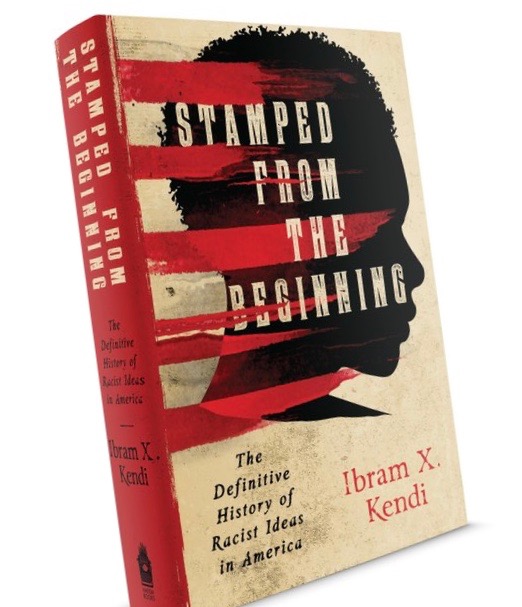EMERGING FEMINISMS, On the Gender Racism of Black Men towards Black Women
By Ibram X. Kendi

In the prologue of my new book, Stamped from the Beginning: The Definitive History of Racist Ideas in America, I shared a confession. Before working on this book, I held some anti-Black racist ideas. I held notions of Black inferiority.
Racist ideas are ideas. Anyone can express them. Anyone can hold both antiracist and racist ideas, that certain things are wrong with Black people and other things are equal.
I reject all those dogged claims that Black people cannot be racist (towards Black people). The only difference between a Black employer and a White employer refusing to hire a supposed lazy Black woman is the skin color of the employer. The racist idea is the same. The employment discrimination is the same. She leaves without a job because some racist assumed she’d be lazy because supposedly Black women are lazy.
This is an example of gender racism—and writing Stamped from the Beginning forced me to confront my own notions of gender racism. Gender racism is any idea that suggests any racial-gender group is inferior or superior in any way to another racial-gender group. Think about it this way. To call women lazy is sexism. To call Black people lazy is racism. To call Black women lazy is gender racism.
If not for the rich field of Black women’s history, we would hardly know about this gender racism. Because sweeping histories of racism and sexism have sidelined all the bigotry tailored to Black women—and they have almost completely left out the gender racism of Black men towards Black women. I shared this history in Stamped from the Beginning as part of the larger history of racist ideas in America. Whether we want to admit it or not, some Black men (and even some Black women) have consumed and reproduced many of the racist ideas White people have produced about Black men, about Black women.
White male slaveholders produced the racist idea of the sexually aggressive Black woman, often to exonerate themselves of rape in the court of public opinion. As William Smith maintained in New Voyage to Guinea in 1744, Black women possessed a “temper hot and lascivious, making no scruple to prostitute themselves to the Europeans for a very slender profit, so great is their inclination to white men.”
Black men reproduced this gender racism after the Civil War. “The greater portion of the colored women, in the days of slavery, had no greater aspiration than that of becoming the finely-dressed mistress of some white man,” novelist William Wells Brown wrote in My Southern Home (1880).
Three years later, George Washington Williams finished the first full-length history of African Americans, writing against those racist Whites claiming slavery had developed Black folk after epochs in African barbarism. Williams helped to popularize the racist idea of the brutally strong Black woman in 1883. Native African women (and then enslaved African women) were “stupid, sulky and phlegmatic” and “brutal,” Williams wrote, citing Savage Africa (1864). But in freedom, Black women are learning to be “pure and womanly” like White women, Williams concluded.
William Hannibal Thomas disagreed in his best-selling 1901 treatise, The American Negro—a book that earned him the appellation “Black Judas.” “Not only are fully ninety per cent of the negro women of America lascivious by instinct and in bondage to physical pleasure, but that the social degradation of our freedwomen is without parallel in modern civilization,” Thomas wrote.
Boxing champion Jack Johnson, who refused to publically date Black women, thought their social degradation operated in the way they treated their men. Johnson loathed “no matter how colored women feel towards a man, they don’t spoil him and pamper him and build up his ego.”
Black women’s indecorum extended to their parenting, sociologist E. Franklin Frazier contended in his landmark study on the Black family in 1939. Frazier painted broad strokes of the low income Black family as a disordered, matriarchal albatross with daughters learning to imitate “the loose behavior of their mothers” and transmitting “moral degeneracy” from one generation to the next.
By the 1960s, buttressed by White sociologists like Daniel Patrick Moynihan, Black men were claiming brutal “Black matriarchs” were emasculating Black men. And they were aesthetically letting themselves go, compelling Black men to date White women, argued psychiatrists William Grier (father of comedian David Alan Grier) and Price Cobbs in their influential 1968 text, Black Rage.
Since the 1960s, Black men have continued to consume and reproduce racist ideas about brutally strong Black matriarchs, about “welfare queens,” about sexually immoral “crack hoes” and teen mothers, about scheming Black women allying with White men to supposedly keep the Black man down. After Anita Hill accused Clarence Thomas of sexual harassment during his confirmation hearings in 1991, Thomas declared himself a victim of “a high-tech lynching.” And Black men rushed to his defense, claiming yet again a Black woman was used by Whites to keep the Black man down.
In public, in private relations, any negative behavior by any Black woman reinforced for racist Black men what was wrong with Black women, even as negative behavior by a non-Black woman only reinforced for them what was wrong with that individual. Writings by racist Black men presenting these purported negative behaviors have proliferated in recent years, writings like Pastor Monte Maddox’s, What’s Wrong With Black Women? (2002). “What we all know to be a fact, is that a large number of black women possess…a very nasty demeanor which has become a real turn-off for black men,” Maddox wrote.
Just as racist Whites have proclaimed their racist ideas about Black people are facts, so too have racist Black men proclaimed their racist ideas about Black women are facts. Racist Black men have rejected the “facts” of racist Whites and accepted their own, not realizing they were rejecting and accepting two sides of the same racist coin. Black men have denied their own racist ideas about Black women as stubbornly as non-Blacks.
Racist ideas have done their job on Black men, but not all Black men, on all issues, at all times. Some Black men have found a way to relate “across our human differences as equals,” as Audre Lorde famously asked humans to do in 1980. Some Black men have spent their lives loving and appreciating Black women and adopting an antiracist feminism. Some Black men have fought alongside Black feminists defending Black woman’s humanity, like prominent suffragists’ Frederick Douglass and W.E.B. Du Bois. In his 1920 scorcher, “The Damnation of Womanhood,” Du Bois blasted the “wanton and continued and persistent insulting of the black womanhood,” nine years before Wallace Thurman penned the classic Black beauty novel, The Blacker the Berry.
But far too many Black men have joined non-Blacks on racist paths, or straddled the paths between racist and antiracist ideas about Black women. Far too many Black men—myself included—have spent too much time blaming Black women for all the existing and persisting disparities and inequities between them and other racial-gender groups. We have spent far too much time attacking Black women instead of discriminators.
Black men can no longer be fooled by racist ideas. Black men must realize that the only thing wrong with Black people is that we think something is wrong with Black people.
 Ibram X. Kendi is an assistant professor of African American history at the University of Florida and author of the new book Stamped from the Beginning: The Definitive History of Racist Ideas in America. He also authored the award-winning book The Black Campus Movement. Kendi has received research fellowships and visiting appointments from a variety of institutions and associations, including the American Historical Association, Library of Congress, National Academy of Education, Spencer Foundation, Brown University, and Princeton University. He is a frequent public speaker and writer of commentaries in publications like The Chronicle of Higher Education, Salon, and Signature.
Ibram X. Kendi is an assistant professor of African American history at the University of Florida and author of the new book Stamped from the Beginning: The Definitive History of Racist Ideas in America. He also authored the award-winning book The Black Campus Movement. Kendi has received research fellowships and visiting appointments from a variety of institutions and associations, including the American Historical Association, Library of Congress, National Academy of Education, Spencer Foundation, Brown University, and Princeton University. He is a frequent public speaker and writer of commentaries in publications like The Chronicle of Higher Education, Salon, and Signature.




0 comments